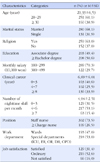Abstract
Purpose
This study was conducted to investigate the relations among gratitude, depression, and psychological well-being among clinical nurses.
Methods
The participants were 411 clinical nurses, working in U city. Data were collected during the four months, April to June, 2012. Data were analyzed using descriptive analysis, t-test, ANOVA, Pearson correlation coefficients and multiple regression with the SPSS/WIN 20.0 program.
Results
The mean scores for gratitude and psychological well-being were above average. The mean score for depression presented a probable depression level. Psychological well-being in clinical nurses was significantly correlated with gratitude (r=.55, p<.001) and depression (r=-.62, p<.001). The significant predictors of psychological well-being for clinical nurses were depression (β=-.47, p<.001) and gratitude (β=.34, p<.001), which explained 48.0% of the variance in psychological well-being.
Figures and Tables
References
1. Korean Health and Medical Workers' Union. Comparison of nursing human resources international hospital study. 2010.
2. Lee WH, Kim CJ. The relationship between depression, perceived stress, fatigue and anger in clinical nurses. J Korean Acad Nurs. 2006; 36(6):925–932.

3. Shields M, Wilkins K. Finding from the 2005 national survey of the work and health of nurses. Catalogue No. 83-003-XPE. Ottawa: Minister of Industry;2006. 12.
4. Lee KH, Song JS. The effect of emotional intelligence on self-efficacy and job stress of nurses-Mediating role of self-efficacy-. J Korean Acad Nurs Adm. 2010; 16(1):17–25.

5. Lee YS. The structural relationship between subjective wellbeing and related variables in clinical nurses [dissertation]. [Busan]: Kosin University;2013. 91.
6. Healy CM, McKay MF. Nursing stress: The effects of coping strategies and job satisfaction in a sample of Australian nurses. J Adv Nurs. 2000; 31(3):681–688. DOI: 10.1046/j.1365-2648.2000.01323.x.

7. McCullough ME, Emmons RA, Tsang J. The grateful disposition: A conceptual and empirical topography. J Pers Soc Psychol. 2002; 82:112–127. DOI: 10.1037/0022-3514.82.1.112.

8. Kwon SJ, Kim KH, Lee HS. Validation of the Korean version of gratitude questionnaire. Korean J Health Psychol. 2006; 11(1):177–190.
9. Ham KA, Byeon BH, Cheon SM. The relationship between gratitude and psychological well-being in adolescents: The moderating effect of stress coping strategy. Korean J Couns. 2011; 12(6):2163–2176.

10. Vaccarino V, Kasl SV, Abramson J, Krumholz HM. Depressive symptoms and risk of functional decline and death in patients with heart failure. J Am Coll Cardiol. 2001; 38:199–205.

11. Yeom EY, Jeon HO. Relations of burnout, interpersonal relations, professional self-concept and depression in clinical nurses. J Korea Acad Industr Coop Soc. 2013; 14(6):2869–2879.

12. Liu Q, Shono M, Kitamura T. Psychological well-being, depression, and anxiety in Japanese university student. Depress Anxiety. 2009; 26(9):99–105. DOI: 10.1002/da.20455.
13. Kim Mj, Kim KB. Influencing of psychological well-being for middle aged and elderly. J East West Nurs Res. 2013; 19(2):150–158.
14. Kim MS, Kim HW, Cha KH. Analyses on the construct of psychological well-being (PWB) of Korean male and female adults. Korean J Soc Psychol. 2001; 15(2):19–39.
15. Ryff CD. Happiness is everything, or is it? Explorations on the meaning of psychological well-being. J Pers Soc Psychol. 1989; 57:1069–1081. DOI: 10.1037/0022-3514.57.6.1069.

16. Strauss GP, Sandt AR, Catalano LT, Allen DN. Negative symptoms and depression predict lower psychological well-being in individuals with schizophrenia. Compr Psychiatry. 2012; 53(8):1137–1144. DOI: 10.1016/j.comppsych.2012.05.009.

17. Choi YJ, Sung YH. Psychological well-being, perceived health status, and health promoting behavior of clinical nurses. J Korean Acad Nurs Adm. 2013; 19(5):589–598.

18. Kim HJ. The effect of nurse's job-stress on well-being: the moderating effect of stress coping strategies and optimism [master thesis]. [Jinju]: Gyeongsang National University;2010. 55.
19. Lee MY, Kim K. Influence of head nurses' transformational leadership on staff nurse's psychological well-being, stress and somatization -focused on the mediating effect of positive psychological capital-. J Korean Acad Nurs Adm. 2012; 18(2):166–175.

20. Sohn SK, Kim MS, Lee YS, Park HK, Roh MY. The mediating effect of social support and stress on optimism and psychological well-being in clinical nurses. J East West Nurs Res. 2014; 20(1):63–71.

21. Park SJ, Son EY. Factors of psychological well-being and the relations with psychological well-being, teacher efficacy, job satisfaction in elementary school female teachers. J Korean Teach Educ. 2011; 27(3):151–166.
22. Lee YH. The relationship between job satisfaction and egoidentity with psychological well-being of the office workers [master thesis]. [Seoul]: Sookmyung Women's University;2009. 55.
23. Radloff LS. The CES-D scale: A self-report depression scale for research in the general population. Appl Psychol Meas. 1977; 1(3):385–401. DOI: 10.1177/014662167700100306.
24. Cho MJ, Kim KH. Diagnostic validity of the CES-D (Korean Version) in the assessment of DSM-III-R major depression. J Korean Neuropsychiatr Assoc. 1993; 32:381–399.
25. Cho MJ, Nam JJ, Suh GH. Prevalence of symptoms of depression in a nationwide sample of Korean adults. Psychiatry Res. 1998; 81:341–352.

26. Watkins PC, Woodward K, Stone T, Kolts RL. Gratitude and happiness: Development of a measure of gratitude, and relationships with subjective well-being. Soc Behav Pers. 2003; 31:431–451.

27. Emmons RA, McCullough ME. Counting blessings versus burdens: An experimental investigation of gratitude and subjective well-being in daily life. J Pers Soc Psychol. 2003; 84(2):377–389.

28. Park SG, Chang SJ, Kim HC, Min JY. Job stress and depressive symptoms among Korean employees: the effect of culture on work. Int Arch Occup Environ Health. 2008; 82(3):397–405. http://springerlimk.com.libaccess.lib.mcmaster.ca.

29. Alavi HR. Correlatives of happiness in the university students of Iran. J Relig Health. 2007; 46:480–499. DOI: 10.1007/s10943-007-9115-4.





 PDF
PDF ePub
ePub Citation
Citation Print
Print







 XML Download
XML Download